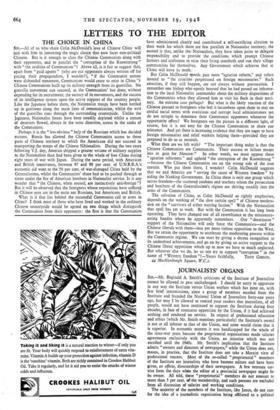LETTERS TO THE EDITOR
THE CHOICE IN CHINA
SIR,—All of us who share Colin McDonald's love of Chinese China will join with him in lamenting the tragic choice that now faces non-political Chinese. But is it enough to class the Chinese Communists along with their opponents, and to parallel the " corruption of the Kuomintang " with " the aridities of Communism"? Above all, is it fair to suggest that, apart from " paid agents " (why are our opponents always written off for paying their propagandists, I wonder?), " if the Communist armies were disbanded tomorrow, Communism would cease to exist in China "? Chinese Communism built up its military strength from its guerrillas. No guerrilla movement can succeed, as the Communists' has done, without depending for its recruitment, the secrecy of its movements, and the success of its intelligence system upon the active support of the country people. Like the Japanese before them, the Nationalist troops have been bottled up in garrisons along the main lines of communication, whilst the writ of the guerrillas runs through the surrounding countryside. Unlike the Japanese, Nationalist forces have been steadily depleted whilst a stream of deserters flowed, always in the same direction, across to the ranks of the Communists.
Perhaps it is the " less obvious " help of the Russians which has decided matters. Russia has allowed the Chinese Communists access to those parts of Chinese territory to which the Americans did not succeed in transporting the troops of the Chinese Nationalists. During the two years following V.J. day, America shipped a greater volume of military supplies to the Nationalists than had been given to the whole of free China during eight years of war with Japan. During the same period, with American and British connivance, between 97 and 98 per cent. of U.N.R.R.A.'s economic aid went to the 50 per cent. of war-damaged China held by the Generalissimo, whilst the Communists' share had to be pushed through at times under the fire of American bombers in Nationalist service. Is it any wonder that " the Chinese, when roused, are instinctively anti-foreign"? But it will be observed that the foreigners whose reputations have suffered in Chinese eyes are in the main not Russians, but Americans and British.
What is it that lies behind the successful Communist call to arms in China? I think most of those who have lived and worked in the ordinary Chinese countryside would be agreed on two things which distinguish the Communists from their opponents: the first is that the Communists have administered cleanly and contributed a self-sacrificing altruism to their work for which there are few parallels in Nationalist territory; the second is that, unlike the Nationalists, they have taken pains to delegate responsibility and to provide the conditions which prompt Chinese farmers and craftsmen to raise their living standards and run their village communities for themselves. Any Government which achieves that in China will leave its mark.
But Colin McDonald speeds past mere "agrarian reform," and refers instead to " the cruelties perpetrated on foreign missionaries." Such atrocities, if they still happen, are not always without provocation. I remember one bishop who openly boasted that he had passed on informa- tion to the local Nationalist commander about the military dispositions of the Communists when they allowed him to visit his flock in their terri- tory. An extreme case perhaps? But what is the likely reaction of the Chinese peasant to foreigners who feel it incumbent upon them to stay on cordial social terms with avaricious and corrupt local administrators yet do not scruple to denounce their Communist opponents whenever the opportunity offers? We foreigners see the picture in a different light, of course, but it is not easy for the Chinese Communists to share our tolerance. And yet there is increasing evidence that they are eager to have foreign missionaries and relief workers helping them—provided they are prepared to do so as neutrals.
What then are we left with? " The important thing today is that the Chinese Communists are Communists. Their success or failure means
loss or gain for Moscow." In other words, we must oppose these
" agrarian reformers " and uphold " the corruption of the Kuomintang " —because the Chinese Communists are on the wrong side of the iron curtain. Who put them there, I wonder? Colin McDonald suggests that we and America are " serving the cause of Western freedom " by aiding the Nanking Government. In China there is only one group which serves freedom—the scattered students and teachers whom the persecution and butchery of the Generalissimo's regime are driving steadily into the arms of the Communists.
The salvation of China, as Colin McDonald so rightly emphasises, depends on the working of " the slow certain spell " of Chinese modera- tion on the " survivors of either warring faction." With the Nationalists that spell has yet to work. But with the Communists it has long been operating. They have changed out of all resemblance to the missionary- eating bandits whom he apparently remembers. Our " doctrinaire " support of the Nationalists will only force the Communists—and the Chinese liberals with them—into yet more violent opposition to the West.
But we retain the opportunity to accelerate the moderating process within the Communist regime. We can start by giving a decent recognition to its undoubted achievements, and go on by giving an active support to the Chinese liberal opposition which up to now we have so much neglected. But whatever else we do, let us not try to support "corruption " in the name of " Western freedom "I—Yours faithfully, TONY GIBSON. 44 Mecklenburgh Square, W.C.I.


































 Previous page
Previous page